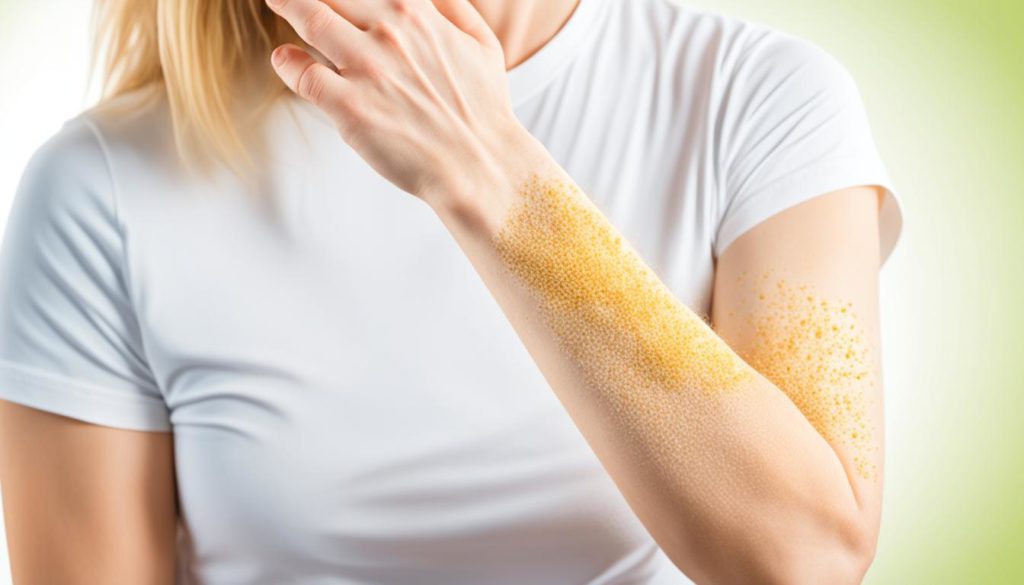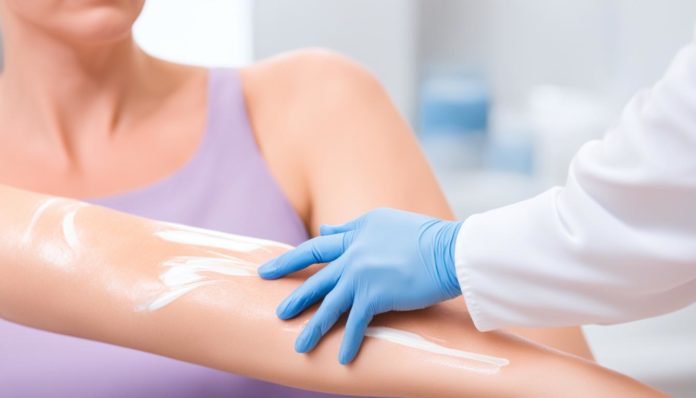Did you know over 50 million Americans deal with chronic skin itching, known as Pruritus, yearly? Many struggle to find relief for their itchy skin. In this guide, we’ll delve into Pruritus’s causes, symptoms, and how to treat it. You’ll learn how to recognize and manage this condition effectively.
Key Takeaways
- Pruritus affects over 50 million Americans annually.
- This guide will cover the causes, symptoms, and treatments of Pruritus.
- Understanding the root cause of skin irritation is essential for effective management.
- Both dermatologists and at-home treatments play crucial roles in alleviating symptoms.
- Proper identification of symptoms can lead to more effective treatments for itchy skin.
What is Pruritus?
Pruritus is the medical term for the feeling of itchiness. It makes you want to scratch. This can range from a mild to a severe itch and affect how you enjoy life. Itchy skin is often a sign of deeper health issues, making it important to know what Pruritus means.
Pruritus starts in the skin and leads to scratching. Too much scratching can harm the skin, creating a cycle of itch-scratch-itch. Knowing what causes itchy skin is key to dealing with it effectively.

Life can be hard for those with severe Pruritus. The constant need to scratch can mess with sleep and daily tasks. It can also make you feel stressed. Finding and treating the causes of itchy skin is crucial for better health.
To really understand Pruritus, we’ll look into its causes, linked conditions, and treatments next.
Common Causes of Itchy Skin
Many people suffer from itchy skin, known as pruritus. Knowing what causes it helps us prevent and manage it. Here, we explore the main reasons why skin itches.
Skin Conditions
Itchy skin often comes from skin issues like dermatitis, eczema, and psoriasis. These are mainly due to an autoimmune response or genetics. This makes the skin inflamed and irritated.
Environmental Factors
The environment around us can also make our skin itch. In winter, dry weather can remove skin moisture, causing dryness and itch. Also, pollutants, strong chemicals, and too much sun can harm our skin.
Allergic Reactions
Allergic reactions are a big cause of itchy skin too. Things like pollen, pet fur, and some foods can set off our immune system. Being in direct contact with something like poison ivy or nickel can cause a lot of itching.

| Cause | Skin Condition | Environmental Factor | Allergic Reaction |
|---|---|---|---|
| Dry Weather | Dermatitis | Poor Air Quality | Pollen |
| Harsh Chemicals | Eczema | Sun Exposure | Pet Dander |
| Pollution | Psoriasis | Cold Temperatures | Nickel |
Pruritus and Dermatology
Dermatology is key to pointing out and treating itchy skin, also known as pruritus. Dermatologists help patients by giving a full check-up and creating a treatment plan just for them.
Role of Dermatologists
Dermatologists are experts in skin health, focusing on conditions like itchy skin. They know how to pinpoint why the skin is itchy. This could be due to a disease, an allergic reaction, or a skin issue. With high-tech tools and treatments, dermatologists make sure patients get the right help to ease their itch.
Common Diagnostic Methods
To find out why skin itches, dermatologists have a few tricks up their sleeves. These include:
- Skin Biopsies: Here, a tiny piece of skin gets removed and checked under a microscope. This helps spot any odd changes.
- Patch Tests: In this test, tiny bits of allergens touch the skin to see if there’s a reaction. It helps figure out allergies that might cause itching.
- Blood Tests: These tests look for diseases in the body that might make the skin itch, like issues with the liver or kidneys.
These methods give dermatologists a clear picture of a patient’s condition. Then, they can make a treatment plan that fits each person. This is how dermatology keeps getting better at managing itchy skin.
Skin Conditions Associated with Pruritus
Pruritus, or chronic itching, is troubling and ties to many skin conditions. Eczema and psoriasis are two main culprits of non-stop itch. Knowing how they lead to itching helps in easing the discomfort.
Eczema
Eczema is a common skin issue that shows as red, itchy, and swollen spots. It happens when the skin’s protective barrier gets weak, leading to dryness and itchiness. Things like irritants, allergens, and stress can make eczema worse, causing more itching.
Psoriasis
Psoriasis is a chronic skin problem that also comes with itching. It makes skin cells grow too fast, leading to thick, scaly patches that itch. These scales may crack and bleed, adding to the discomfort. Triggers include infections, skin injuries, and some medications.
Other Skin Disorders
Other skin disorders linked to pruritus include xerosis, lichen planus, and contact dermatitis. These issues either damage the skin barrier or trigger an immune response, causing significant itching. Treating these conditions often means reducing inflammation and healing the skin.
| Condition | Characteristics | Triggers | Management |
|---|---|---|---|
| Eczema | Red, itchy, inflamed patches | Irritants, allergens, stress | Moisturizers, corticosteroids, avoiding triggers |
| Psoriasis | Thick, scaly, itchy plaques | Infections, injuries, medications | Topical treatments, systemic medications, phototherapy |
| Contact Dermatitis | Red, itchy rash | Chemical exposure, allergens | Avoiding triggers, topical steroids |
| Xerosis | Extremely dry, scaly skin | Weather, aging, low humidity | Moisturizers, humidifiers |
| Lichen Planus | Purplish, itchy, flat-topped bumps | Immune response | Topical corticosteroids, antihistamines |
Identifying Symptoms of Pruritus
Getting to know the symptoms of Pruritus is key to handling it well. A big sign is an itch that won’t stop, from a little to a lot. This constant need to scratch can mess up the skin or cause infections.
There are other itchy skin symptoms too:
- Redness: Skin often turns red, showing it’s inflamed and upset.
- Bumps: Itchy spots may get raised bumps, hinting at an allergy or something else.
- Dryness: Pruritus usually makes skin very dry and flaky.
- Thickened Skin: Lots of scratching means skin can get thick and tough.
- Scaly Patches: Issues like eczema or psoriasis often cause dry, scaly spots.
The types of symptoms of Pruritus can change based on what causes it. Allergies might bring short-term problems like hives. But long-term skin issues tend to make skin stay itchy.
So, knowing all the different symptoms is super important. It helps in dealing with Pruritus quickly and effectively.
Impact of Rashes on Pruritus
Rashes often make the discomfort of itching worse for people. By understanding how rashes affect itching, we can find better ways to manage it. This involves coming up with strategies and treating different rashes.
Different Types of Rashes
Many rashes can lead to increased itching. Some of the main ones are:
- Eczema: This itchy, red, and inflamed rash greatly affects how bad the itching gets.
- Psoriasis: A long-term skin issue that features itchy, dry skin with silvery scales.
- Contact Dermatitis: Red, itchy, sometimes blistered skin caused by contact with irritants or allergens.
- Heat Rash: This itchy rash happens in hot, humid weather.
- Fungal Infections: Rashes like ringworm that itch and make the discomfort of pruritus worse.
Rash Management Strategies
Managing rashes well is key to controlling itchy skin and reducing pruritus symptoms. Some helpful approaches include:
- Moisturizing: Using lotions and moisturizers often soothes dry, irritated skin.
- Topical Treatments: Using creams with corticosteroids or antihistamines helps lower inflammation and itch.
- Protective Measures: It’s important to wear the right clothes, avoid things that cause rashes, and keep clean to stop rashes from getting worse.
- Medication: Sometimes doctors prescribe pills or drugs that suppress the immune system to tackle severe rashes and itching.
- Home Remedies: Things like oatmeal baths, cold cloths, and aloe vera soothe itching and swelling.
The Role of Allergic Reactions in Pruritus
Allergic reactions can often trigger Pruritus, leading to itchiness. The body’s immune system sometimes reacts too strongly to substances like pet dander or pollen. This causes the release of histamines, which leads to itching. It’s key to know and avoid these triggers for better management of Pruritus.
- Pet Dander: Skin flakes from animals can trigger allergies.
- Pollen: Seasonal allergens from trees, grass, and weeds.
- Food Allergies: Common triggers include nuts, shellfish, and dairy.
When the body meets these allergens, allergic reactions may happen. These might cause mild to severe itching and swelling. This can lead to visible skin issues or worsen existing skin conditions.
Here is a table that shows common allergens and their impacts on the skin:
| Allergen | Source | Potential Reaction |
|---|---|---|
| Pet Dander | Cats, dogs, and other furry pets | Itchy, red skin; hives |
| Pollen | Plants, trees, grasses | Sneezing, itchy eyes, itchy skin |
| Food Allergies | Peanuts, shellfish, dairy | Hives, eczema, spreading itchiness |
To reduce Pruritus, managing allergies is key. This means avoiding known allergens, using antihistamines, and topical treatments to ease itching.
Treatment Options for Pruritus
Managing pruritus means taking different steps based on how severe the itching is and its cause. Treatment choices can include topical treatments for Pruritus, medicines throughout the body, and other alternative methods.
Topical Treatments
First, we often use topical treatments to quickly ease the itch. These can have cooling agents like menthol or camphor. Research shows calcineurin inhibitors and capsaicin cream work well against many itching types.
Systemic Treatments
If creams and lotions don’t fully help, there are other systemic options. These include pills or shots aimed at the root cause of the pruritus. Medications like antihistamines, corticosteroids, and antidepressants are used. For example, antihistamines tackle allergies, while corticosteroids may be better for inflammation.
Alternative Therapies
Beyond standard treatments, many seek out alternative options for a whole-body approach. These include light therapy, acupuncture, and herbal solutions. Light therapy reduces inflammation and changes how the skin reacts. Acupuncture and herbs have also helped some, but we need more studies to prove their effectiveness.
With so many options out there, talking to a healthcare provider is crucial. They can help mix topical treatments for Pruritus, systemic treatments, and alternative therapies for itchy skin. This way, you get a personalized plan that works for you.
When to Seek Medical Help
Itchy skin can really bother you, especially if home cures don’t work. It’s crucial to know when to seek medical help. You should see a doctor in these situations:
If the itch is strong or won’t go away, you need Pruritus medical advice. If you still itch after two weeks, despite using over-the-counter remedies, see a specialist. Also, if it’s so bad that it messes with your daily life or sleep, you must seek medical help for itchy skin.
If you have other symptoms along with the itch, it’s time to get medical advice. Look out for:
- Swelling or redness
- Skin lesions or blisters
- Signs of infection like pus or extra warmth in the area
- Unexplained weight loss, fever, or night sweats
If you notice these, getting Pruritus medical advice is key. There might be a deeper issue causing the itch. A doctor can find out why and how to treat it.
Here’s a table to help understand when to treat itching at home, and when to get help:
| Situation | Home Care | Seek Medical Help |
|---|---|---|
| Itch Duration | Less than 2 weeks | More than 2 weeks |
| Severity | Mild to moderate | Severe, affecting daily activities or sleep |
| Accompanying Symptoms | No additional symptoms | Swelling, redness, blisters, or infection signs |
| Over-the-counter Treatment Effectiveness | Effective | Ineffective |
Spotting these signs early can help you decide when to seek medical help for itchy skin. Getting care quickly means a better diagnosis and treatment, improving your quality of life.
Self-Care Strategies for Managing Itchy Skin
Self-care strategies for Pruritus can make life better by easing itchy skin. They can also stop more irritation. It’s key to have a good skincare routine and use home remedies and products you can buy without a prescription.
Daily Skincare Routine
A daily skincare routine for Pruritus is crucial for skin that’s healthy and not itchy. Keeping skin hydrated by moisturizing daily helps lower dryness that makes itching worse. Choose products without fragrance to avoid making the irritation stronger:
- Put on a heavy, fragrance-free moisturizer right after you shower to keep moisture in.
- Pick soaps and cleansers that are mild and free from harsh stuff.
- Use gentle scrubs once a week to take off dead skin cells without hurting your skin.
Also, taking short showers with warm, not hot, water helps. A humidifier in your house can keep the air moist.
Home Remedies and Over-the-Counter Products
Home remedies and products from stores can also help with itchy skin relief. Things that can help include:
- Putting on things that cool the skin like calamine lotion or menthol creams.
- Taking antihistamines you can buy without a prescription if allergies cause the itch.
- Having baths with colloidal oatmeal or baking soda to calm the skin.
Reducing stress through meditation and yoga helps too, as stress can make pruritus worse. Eating healthy foods with lots of vitamins and minerals helps your skin and reduces itchiness.
Using these self-care methods with a doctor’s advice is best when dealing with pruritus. The Mayo Clinic has more information on treating and understanding pruritus.
Conclusion
To understand and manage itching, you should start by finding out what causes it. There are many causes, like skin problems or allergies. By knowing these triggers, figuring out and treating itching gets easier.
A good skincare routine and the right treatments can make your skin feel better. It can also stop the itching. Topical and systemic therapies are part of these treatments.
Skin doctors, or dermatologists, are key in figuring out why you’re itching. They use different methods to find the exact reason. If you see them soon enough, they can help you avoid worse problems and get you on the path to feeling better.
Doing simple things for your skin every day can also help a lot. Trying some home remedies might be useful too. These steps can ease the itch and make your skin healthier.
Getting ahead of itching means paying attention to the signs, knowing what makes it happen, and getting the right help. The goal is to feel comfortable in your skin and be healthy overall. By keeping up with this, people can find relief and have better skin.
FAQ
What is Pruritus?
Pruritus, often called itchy skin, makes you want to scratch. It points to different health issues. These include skin problems, allergic reactions, and diseases that affect the whole body.
What are common causes of itchy skin?
Itchy skin comes from many sources. Skin issues like eczema and dry weather are common causes. Allergies to pets, pollen, or foods also lead to itchiness.
How do dermatologists diagnose Pruritus?
Dermatologists have ways to find out why skin itches. They may take a piece of skin, do allergy tests, or blood tests. These help find the right treatment.
What skin conditions are associated with Pruritus?
Eczema and psoriasis are often linked to Pruritus. Conditions like dermatitis also cause long-term itch and irritation.
What are the symptoms of Pruritus?
Pruritus symptoms include ongoing itching, red spots, and irritated skin. These can change depending on the cause. They may lower life quality.
How do rashes impact Pruritus?
Rashes make Pruritus worse by making you itch more. The right treatment depends on the rash type, from allergies or infections.
What role do allergic reactions play in Pruritus?
Allergic reactions can bring on Pruritus. The immune system reacts to things like pet dander or foods. This leads to more itch and skin problems.
What treatment options are available for Pruritus?
Treatments for Pruritus vary. They range from creams, antihistamines to light therapy. What’s chosen depends on what’s causing the itch and how bad it is.
When should I seek medical help for Pruritus?
Get help if the itch is bad, won’t go away, or comes with swelling or pain. A doctor can find out why and suggest how to treat it.
What self-care strategies can help manage itchy skin?
To handle itchy skin, keep a good skincare routine and moisturize. Avoid things that make you itch. Cool packs or over-the-counter creams may offer relief.


